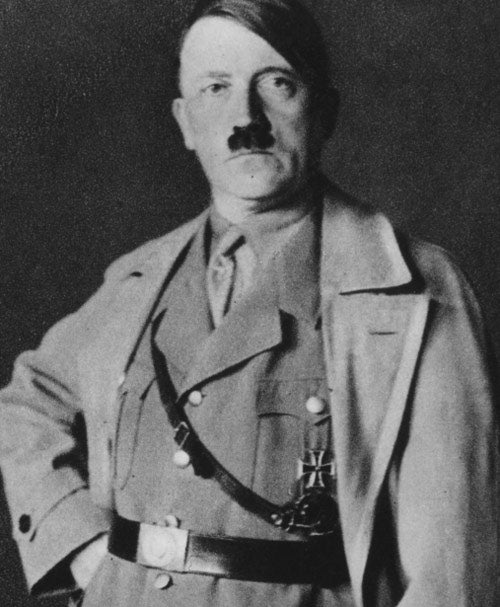Bid to restore Iron Cross divides Germany

Your support helps us to tell the story
From reproductive rights to climate change to Big Tech, The Independent is on the ground when the story is developing. Whether it's investigating the financials of Elon Musk's pro-Trump PAC or producing our latest documentary, 'The A Word', which shines a light on the American women fighting for reproductive rights, we know how important it is to parse out the facts from the messaging.
At such a critical moment in US history, we need reporters on the ground. Your donation allows us to keep sending journalists to speak to both sides of the story.
The Independent is trusted by Americans across the entire political spectrum. And unlike many other quality news outlets, we choose not to lock Americans out of our reporting and analysis with paywalls. We believe quality journalism should be available to everyone, paid for by those who can afford it.
Your support makes all the difference.Germany has launched an anguished and widening debate over proposals to reintroduce the Iron Cross – virtually in its original form – as a military decoration that could be awarded throughout the armed services in recognition of "outstanding bravery".
The Iron Cross still rates as Germany's most famous military insignia, but its role has been reduced to that of a black and white emblem on the aircraft, tanks and warships of the post-war armed forces. It was dropped as a medal in 1945.
Adolf Hitler claimed it was the happiest day of his life when he received the familiar black and silver cross and, although banned as a medal for the past 63 years, any Second World War film would be unthinkable without the decoration appearing on the tunic of some jackbooted general.
Ernst-Reinhard Beck, who is a conservative MP in Chancellor Angela Merkel's government, an army reserve colonel and president of the Army Reservists' Association, said reintroducing the cross was justified because of Germany's new military role abroad.
He conceded that "terror and fear" had been inflicted on nations under the sign of the Iron Cross during the Second World War, but added that the symbol was now a "sign of help and solidarity" as a result of the German army's presence in the Balkans and Afghanistan.
Avoiding mention of the criticism to which Germany is subjected by some of its Nato allies because of its reluctance to commit troops to fight in southern Afghanistan, he added: "Soldiers abroad are always ready to risk their lives and their health to ensure their mission is fulfilled. I can well imagine a new medal taking the form of the Iron Cross as an award for special courage, bravery and achievements."
He said the desire to see the return of the cross was widespread in the armed forces. Soldiers felt that existing military medals were not good enough as many were simply awarded for length of service. More than 5,000 Germans signed a petition last year which called for return of the Iron Cross.
Although its reintroduction is opposed by the Greens and many Social Democrats, supporters point out that the emblem is not synonymous with Nazism. The award was introduced in 1813 by King Frederick Wilhelm III as an outstanding-bravery medal for Prussian soldiers engaged in a "war of liberation" against Napoleon. The medal was awarded during the subsequent Franco-Prussian war of 1870-71 and during the First World War, when its most infamous recipient was Private Adolf Hitler, decorated with the Iron Cross second class for bravery as a dispatch runner in the trenches. Hitler described the day of the award as the happiest of his life and as Nazi leader he was rarely seen without it.
Although the medal fell out of favour after 1918, Hitler revived it in 1939 – albeit with a Nazi swastika embossed on its middle. Despising Germany's other First World War medal, the Blue Max, as it could only be awarded to officers, he favoured the Iron Cross which was open to all.
Franz Josef-Jung, Germany's conservative Defence Minister, said yesterday he was in favour of introducing a medal for "extraordinary bravery". However, politicians from the other parties were less enthusiastic. Rainer Arnold, a leading Social Democrat, dismissed bringing back the cross. "Given the legacy of Hitler and the Second World War, the medal is too burdened by the past for it to be reintroduced," he said.
Elke Hoff, a military specialist for the liberal Free Democrats party, referred to surveys on the German armed services which showed that many soldiers smoked too much, were unfit and were inadequately equipped in the field: "It would be better to provide soldiers abroad with the equipment they really need," she said.
Whether German soldiers will soon be sporting the Iron Cross again remains an open question. Although proposals for a medal to reward outstanding bravery were officially sanctioned by President Horst Köhler, the Defence Ministry's position was unclear. "We have not decided what the new medal should look like," a spokesman said, "However at no time did we consider reintroducing the Iron Cross that was awarded during the Second World War."
Join our commenting forum
Join thought-provoking conversations, follow other Independent readers and see their replies
Comments